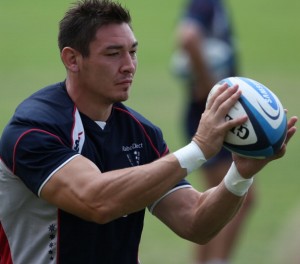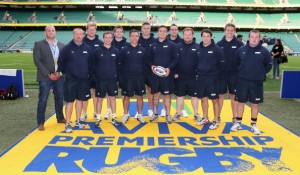
Cherry-picked: Andy Titterrell, here in his Gloucester days, is an ambassador for new charity State of Mind
By Bea Asprey
LAST WEEK we investigated how professional rugby in England is helping players to keep depression at bay, but now it’s time to find out what’s happening at grass-roots level. In part two of this series, London Welsh hooker Andy Titterrell opens up about his own experiences and tells us more about his role as an ambassador for new mental health charity State of Mind.
Rugby World: What sort of pressures do rugby players come under?
Andy Titterrell: In an office job, you are working in the same location every day and with the same people, so it’s possible to get into a comfortable routine. But in rugby, every week is different depending on who you’re playing against, and there’s a lot of travel involved. It’s also the times away from rugby that can be hard, when you’re injured for example. Your daily structure is taken away from you, and you’re not surrounded by your team-mates when you’re rehabbing, so it can leave you feeling isolated. In addition, for professionals, contract negotiations can go down to the wire; clubs leave it til the last minute to sign players and this is effectively playing with people’s lives. At that stage you can be offered less money than you were on before and it’s a stressful situation, especially if you have a family to support.
RW: Can you tell us about your own experience of depression?
AT: In about 2008, I really struggled. I bottled things up and not getting any support meant things snowballed. It got to the stage where I knew I needed to get help, but I had no idea who to approach or who to speak to. I confided a lot in my wife and my Gloucester team-mate at the time Gareth Delve. Eventually I got professional help, away from rugby. I wanted to speak to someone outside of the game, because I knew I would get a non-biased opinion from them. The hardest part was admitting to myself that I had got to the stage where I couldn’t carry on alone, but speaking about what had been happening during the week really helped.
RW: Tell us how you got involved in the charity, State of Mind…
AT: State of Mind (rugby union) was an idea of Mick Finnegann‘s, a previous participant in the School of Hard Knocks programme, who has been through his fair share of troubles in his own life but has come through them very successfully. The charity itself is based on the State of Mind rugby league equivalent, which goes into super league clubs to raise awareness of mental health issues, and help any of their pros who should need it. Their brand and charity is growing massively in league, so Mick decided to replicate it for rugby union. I think it’s a fantastic charity, so I tweeted at them, @SoMRugbyUnion, to ask if they needed any help. When they asked me to be an ambassador I was more than happy to say yes!
RW: What work will the charity be doing?
AT: We want to work in the opposite way to the league charity, and that means targeting grass-roots clubs first, then approaching Championship and Premiership clubs down the line. We want to raise awareness of mental health problems in grass-roots rugby, by going into the clubs and speaking to them directly, and educate people about what steps are available to take. It’s also important for people to understand the importance of staying mentally fit, as well as physically fit – this isn’t just for people who are suffering from depression. We’re not trained counsellors or doctors, but if anyone needs any information we can advise them on how to get help. We want to get out and present to as many clubs as we can, but we won’t take up a lot of people’s time. We’re just talking about a 25-minute chat before or after training, and then we’ll give people handouts to take away.
If you want State of Mind to visit your club, tweet @SoMRugbyUnion







